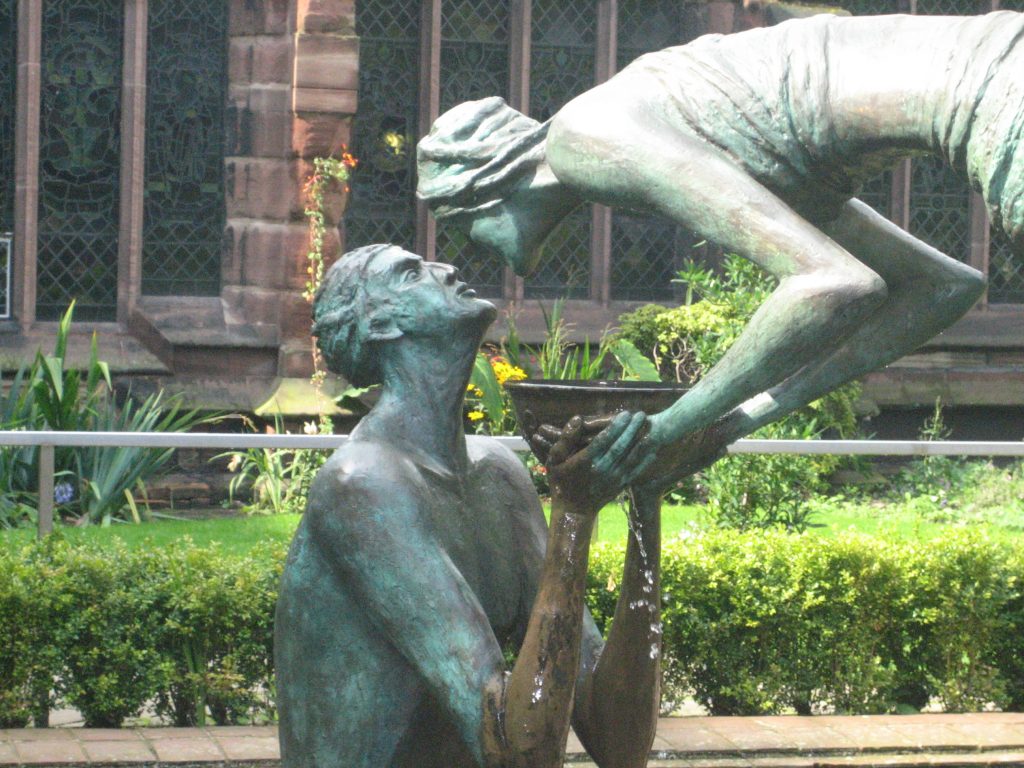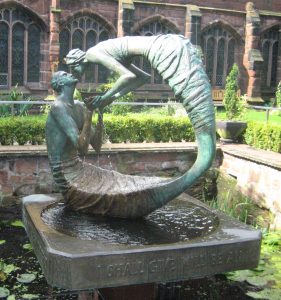by Linda McMillan
This encounter is for thirst quenching, for knowing and for being known.
On his cross, Jesus said, “I thirst.”
The need for water is one of the few things which link every human being on earth. It’s one of the basics. From the moment the birthing waters break, through the baptismal waters, and over the river Styx our lives are centered in water. Yet, we thirst.
This particular well is said to have belonged to Jacob, but there’s no mention of Jacob ever digging a well. The reason the well is mentioned is to put us in mind of the great well created on the evening of the first Shabbat. It once belonged to Abraham, traveled around the desert with Miriam, and finally became the well we consider today. It is a special well because of its history of providing water for God’s people.
In today’s reading, Jesus approached a woman at this particular well and asked her for some water because, like the rest of us, he was thirsty too. The result was the longest reported conversation that Jesus ever had. That is important for a lot of reasons: The woman he spoke to was, well… a woman, a foreign woman, from an enemy nation, who transgressed her sex role by talking about the messiah and things concerning the temple, and engaged in sexual, historical, and political banter with Jesus. It’s one of Jesus’s most interesting encounters. But the thing that is most significant about the length of the conversation is that it allowed both parties to reveal more and more of themselves.
As Jesus and the woman stood there at the well and conversed it was not for the purpose of traditional marriage, which Jesus had no real use for, but for entering into something deeper. This encounter is for thirst quenching, for knowing and for being known.
There are kinds of thirst. There’s the thirst of which I spoke earlier, the thirst that sustains our lives by compelling us to drink. But we thirst for other things too: For status, for recognition, achievement, or just a few minutes of peace! But, mainly, we thirst to be known as we really are.
When Jesus told the woman to go and fetch her husband, she didn’t reveal everything about herself. She only reported the true fact that she was not married. She may have felt that she could get away with mere facts while avoiding the truth. Maybe she had been rejected so much that it was simply a wise move to stick to facts, simple things, irrefutable, but not fully true.
It was Jesus who let her know that she was more deeply known than she realized. “Indeed,” he said, “You are right in saying, ‘I have no husband’; for you have had five husbands, and the one you have now is not your husband. What you have said is true” That statement was more than a fact, it was fully true, and the woman, knew that she was known.
There is a moment of terror, I think, when becoming fully known. I certainly don’t want to be fully known at the bus stop, or at the market, or any other place analogous to the well. You probably don’t either. The woman could have turned away, as many of us would have. She could have become defensive. She could have just walked away, nobody would have cared if she had. But instead she acknowledged the truth of her life and allowed herself to be seen. It was in that moment – during the terror of being known – that she saw Jesus clearly and knew that she’d seen the Messiah!
Christians often wish to know God better, to see more clearly, to understand the divinity that came down to be with us. We study and pray, hoping for some glimmer of what it is we’re dealing with. But, the key might not be in studying and praying. The woman at the well points us in a different, and terrifying, direction.
It was in being known that she saw Jesus for who he really was, quenching her thirst and his too.
Unless we intend to leave Jesus thirsting up on his cross, way up there far away from us and the full truth of our lives, then we must let ourselves be known by him too. Too many prayers acknowledge falling short while also hoping that Jesus didn’t notice this or that; we confess our sins while believing that we got by with those few little things. And, even to Jesus who loves us anyway, we weave together a tapestry that’s just a little more acceptable than the full truth of who we are. Factual, maybe… but not fully true.
The living water that Jesus offers is nothing less than the full knowledge of who he is, his very life. But living waters are not in the well, not in cisterns, or ponds, fountains, or pools. They are neither on a mountain nor in a temple. Living water is slippery. You can’t take hold of it. In fact, if you catch some living water in a cup or a jug, it’s not living water anymore. Living water moves, it’s sometimes swift, overpowering, and uncontrolled. It is spirit, it is truth, and it is terrifying. It is the unknown, or the dark side we all have… acknowledged or not.
The known is how we present, it’s our careers, and churches, and the things we’re sure of, the way we tell our stories so that they make sense. It is contained, like water in a well, or worship in a temple or on a mountain. But when we are very brave and allow the true, wild, and living waters to flow over our most tender roots, and into the furthest crevices of our hidden world we find that not only are we known and loved, but we suddenly know and love in return!
God never intended for us to hold on to the water. Preserving tradition, guarding the faith, conserving and curating the church, or just polishing up our own tarnished images was never our calling. We were made for wilder waters.
For the Lamb at the center of the throne will be their shepherd; ‘he will lead them to springs of living water.’ ‘And God will wipe away every tear from their eyes.'”
Revelation 7:17…
Becoming known is terrifying, I’ll grant you that. But, being known is a comfort. Every tear, wiped away…
Though self-revelation is painful, You can be fully known and live. The woman at the well did it.
Maybe sometime during Lent you will have a chance to sit quietly with God and let her wild waters flow over the hurt and hidden places in your life. Of course, that means that you too have to accept the rougher version of your life, the truer version. But in the gaze of God’s love, under the shadow of his mountain of mercy, you will surely be brave like the woman at the well and you too will say, “Yes, this is who I am,” and allow the wild waters to hold you.
Linda McMillan lives in Yangzhong, China – Home of the pufferfish
Image: Woman at the Well, Chester Cathedral. Photo by Ann Fontaine
Full image of sculpture
Some Notes of Possible Interest
John 19:28… Later, knowing that everything had now been finished, and so that Scripture would be fulfilled, Jesus said, “I am thirsty.”
In Greek mythology the River Styx divides the world of the living and the world of the dead.
Some commenters will note that the presence of a well often denotes a betrothal, and there is ample literary evidence for that. Origen compared the woman at the well with Rebekkah (Genesis 24), Jacob and Rachael (Genesis 29), and Moses and Zipporah (Exodus 2). (The Fathers of the Church: Homilies on Genesis and Exodus, translated by Ronald Heine.) There are significant and direct parallels between the woman at the well and the story of Rachael: Both are at the well in the middle of the day, both are asked to draw water, both rush away to relay the news to others. But the placement of this story and it’s clearly allegorical meaning make me think that we are not supposed to be quite so literal in this case. Instead of an actual marriage, the storyteller is telling us about a different kind of union, intimacy of a different nature. The writer is not even talking about a literal well, or actual water, but the path to eternal life.
10 things created on the eve of the first Sabbath


